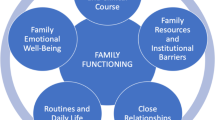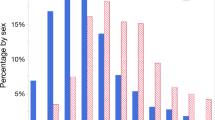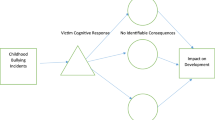Abstract
This paper revisits psychodynamic theory, which can be applied in predictive testing counseling for Huntington’s Disease (HD). Psychodynamic theory has developed from the work of Freud and places importance on early parent–child experiences. The nature of these relationships, or attachments are reflected in adult expectations and relationships. Two significant concepts, identification and fear of abandonment, have been developed and expounded by the psychodynamic theorist, Melanie Klein. The processes of identification and fear of abandonment can become evident in predictive testing counseling and are colored by the client’s experience of growing up with a parent affected by Huntington’s Disease. In reflecting on family-of-origin experiences, clients can also express implied expectations of the future, and future relationships. Case examples are given to illustrate the dynamic processes of identification and fear of abandonment which may present in the clinical setting. Counselor recognition of these processes can illuminate and inform counseling practice.
Similar content being viewed by others
References
Almqvist, E. W., Bloch, M., Brinkman, R., Craufurd, & D., Hayden, MR. (1999). A worldwide assessment of the frequency of suicide, suicide attempts, or psychiatric hospitalisation after predictive testing for huntington’s disease. Am J Hum Gen, 64, 1293–1304.
Baldwin, J. (1954). Go tell it on the mountain. London: Corgi.
Bowlby, J. (1979). The making and breaking of affectional bonds. London: Tavistock Publications.
Codori, A., & Brandt, J. (1994). Psychological costs and benefits of predictive testing for Huntington’s Disease. Am J Med Genet (Neuropsychiatric Genetics), 54, 174–184.
Daniell, D. (1985). Marital therapy: The psychodynamic approach. In Dryden W Marital Therapy in Britain. Buckingham: Open University Press.
Diekmann-Tapon, D. (1999). Case report: Object relations family therapy as a model for genetic counseling J Genet Couns, 4, 235–245.
Decruyenaere, M., Evers-Kiebooms, G., Cloostermans, T., Boogaerts, A., Demyttenaere, K., Dom, R., & Fryns. J. P. (2003). Psychological distress in the 5-year period after predictive testing for Huntington’s disease. Eu J Hum Gen, 11, 30–38.
Dudokde-Wit, A. C., Tibben, A., Duivenvoorden, H. J., Niermeijer, M. F., Passchier, J., & Trijsburg, R. W. (1998). Distress in individuals facing predictive DNA testing for autosomal dominant Late-onset disorders. Am J Med Genet, 75, 62–74.
Duisterhof, M., Trijsburg, R. W., Niermeijer, M. F., Roos, R. A. C., & Tibben, A. (2001). Psychological studies in Huntington’s disease: Making up the balance. J Med Genet, 38, 852–861.
Hall, C. S., & Lindzey, G. (1970). Theories of personality. New York: Wiley.
International Huntington Association and World Federation of Neurology Research Group on Huntington’s Chorea. (1994). Guidelines for the molecular genetics predictive test in Huntington’s Disease. Neurology, 44, 1533–1536.
Kessler, S. (1984). Psychological aspects of genetic counseling. 111. Management of guilt and shame. Am J Med Genet, 17, 673–697.
Kessler, S., & Bloch, M. (1989). Social system responses to Huntington’s Disease. Family Processes, 28, 59–68.
Kessler, S. (1992). Psychological aspects of genetic counseling. V111. Suffering and countertransference. J Genet Couns, 1, 303–308
Kessler, S. (1994). Predictive testing for Huntington’s Disease: A Psychologist’s View. Am J Med Genet, 54, 161–166.
Kessler, S. (1997). Psychological aspects of genetic counseling. Teaching and counseling. J Genet Couns, 6, 287–295.
Lerner, H. (1989). The dance of anger. New York: Harper Perennial.
Myers, R., Murans, K., & MacDonald, M. (1998). Huntington’s disease. In R. Wells, & S. Warren, (Eds.), Genetic instabilities and hereditary neurological diseases, (pp. 301–323). San Diego: Academic Press.
Otlowski, M. F., Taylor, S. D., & Barlow-Stewart, K. (2002). Major study commencing into genetic discrimination in Australia. J Law and Med, 10, 41–48.
Quaid, K. A. (1992). Presymptomatic testing for Huntington’s Disease: Recommendations for counseling. J Genet Counsel, 1, 277–302.
Richards, F., & Taylor, S. (1997). Social work and genetic testing: Ethical issues encountered in predictive testing for Huntington’s Disease. Austral Social Work, 50, 61–67.
Soldan, J., Street, E., Gray, J., Binedell, J., & Harper, P. S. (2000). Pyschological model for presymptomatic test interviews: Lessons learned from Huntington’s Disease. J Genet Counsel, 9, 15–30.
Timman, R., Roos, R., Maat-Kiever, A., & Tibben, A. (2004). Adverse effects of predictive testing for Huntington’s Disease underestimated: Long-term effects 7–10 years after the test, Health Psych, 23, 189–197.
Viorst, J. (1986). Necessary losses. Fireside books. New York: Simon and Schuster.
Winnicott, D. W. (1988). Human nature. London: Free Association Books.
Author information
Authors and Affiliations
Corresponding author
Rights and permissions
About this article
Cite this article
Tassicker, R.J. Psychodynamic Theory and Counseling in Predictive Testing for Huntington’s Disease. J Genet Counsel 14, 99–107 (2005). https://doi.org/10.1007/s10897-005-4066-y
Issue Date:
DOI: https://doi.org/10.1007/s10897-005-4066-y




